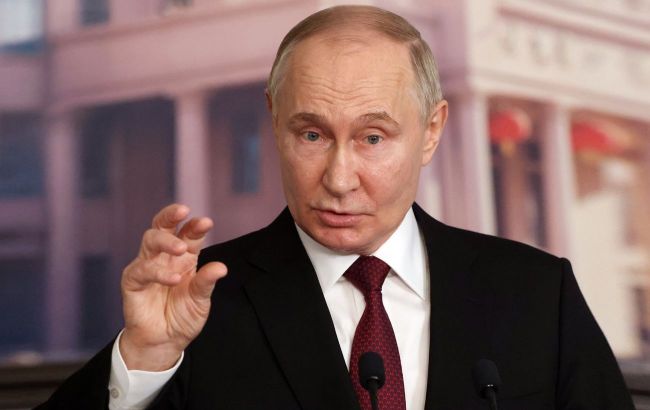What is known about Putin's nuclear threats and Ukraine's response
 Photo: Vladimir Putin, Russian dictator (GettyImages)
Photo: Vladimir Putin, Russian dictator (GettyImages)
Russian President Vladimir Putin has once again begun to intimidate the world with nuclear weapons. This time he announced changes to the Russian nuclear doctrine that will expand the conditions for the use of nuclear weapons.
What is the nuclear doctrine, what changes did Putin announce, and how does Ukraine react to it read in the material by RBC-Ukraine.
Contents:
- What Putin said about nuclear weapons
- Not the first nuclear threats from Russia
- How Ukraine reacts to Putin's statement
What Putin said about nuclear weapons
On the evening of Wednesday, September 25, Russian media reported on a meeting of the Russian Security Council regarding nuclear deterrence, attended by Putin. The Russian President announced that he had decided to make changes to Russia's nuclear doctrine.
The nuclear doctrine is a document that outlines the conditions under which a nuclear country may use its nuclear weapons to strike another state.
Currently, Russia's nuclear doctrine provides for the possibility of a nuclear strike in four cases:
- The launch of a ballistic missile that attacks Russia or its ally.
- The use of nuclear weapons or other types of weapons of mass destruction against Russia or its ally.
- Enemy impact on critically important state or military facilities.
- Aggression against Russia using conventional weapons, threatening the existence of the state.
The last point generally allows Russia to use nuclear weapons even now, but Putin decided to add several more reasons for a nuclear strike to the doctrine.
As he stated, he wants the Russian doctrine to include a nuclear strike in the case of aggression against Russia by any non-nuclear state, but with the involvement or support of a nuclear state, a massive launch of strategic or tactical aviation, cruise missiles, and even drones towards Russia, as well as aggression against Belarus.
Not the first nuclear threats from Russia
These are not the first nuclear threats from the Kremlin's leadership and the Russian government since the beginning of the full-scale invasion of Ukraine. For example, the current Deputy Chairman of the Russian Security Council, Dmitry Medvedev, has repeatedly threatened Ukraine and the West with nuclear strikes.
Moreover, last year Russia transported its nuclear weapons to Belarus, after which the head of the Belarusian regime, Alexander Lukashenko, has repeatedly threatened Europe with their use.
During the full-scale war, Russia has also conducted several military exercises involving the so-called "nuclear triad" — strategic aviation, intercontinental ballistic missiles, and nuclear-powered submarine missile carriers.
Putin himself has also issued nuclear threats on multiple occasions. In particular, he stated that Russia is "technically ready" for nuclear war and that Russian nuclear forces are in a state of full combat readiness.
How Ukraine reacts to Putin's statement
Ukraine has already reacted to the Kremlin leader's latest nuclear statements. The head of the President's Office, Andriy Yermak, described the Putin's statements as nuclear blackmail in his Telegram channel, adding that Russia has no other tools to intimidate the world.
"These tools will not work," he emphasized.
Meanwhile, the advisor to the head of the Office of the President, Mykhailo Podolyak, explained that Putin has once again started to intimidate the world with nuclear weapons because he does not know how to stop Ukrainian strikes on Russia and the operations of the Ukrainian Armed Forces on Russian territory. Moreover, the Russian forces have used all non-nuclear weapons against Ukraine but still failed to achieve victory.
"Traditional propaganda and traditional threats do not work... Undoubtedly, Russia is trying to use its last argument, the argument of fearful people, that they have nuclear weapons," Podolyak said.
The head of the Center for Countering Disinformation at the National Security and Defense Council, Andriy Kovalеnko, also considers Putin's statement to be blackmail. In his opinion, this is related to Putin's fear of Ukrainian weapons, which deprive Russia of strategic weapon stockpiles and harm its ability to continue terror.
"These events regarding the update of the nuclear doctrine and threats were supposed to follow successful tests of the Sarmat intercontinental missile, according to Putin's plan. But it couldn’t even take off," he added.
Sources: statements from Vladimir Putin, head of the President's Office Andriy Yermak, advisor to the head of the Office of the President Mykhailo Podolyak, and head of the Center for Countering Disinformation Andriy Kovalеnko.
It is worth noting that earlier, American General David Petraeus expressed the opinion that Russia would not use nuclear weapons in the war against Ukraine, as the West threatened the Kremlin with a response.



